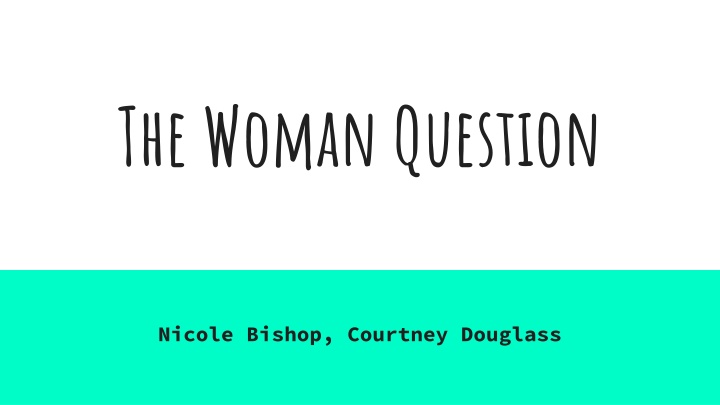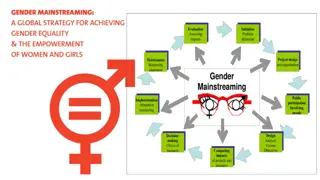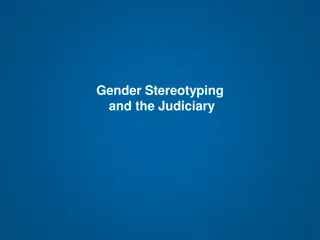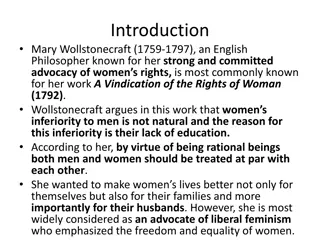The Women Question: A Historical Perspective on Gender Rights
The debate on women's rights and roles in society has a rich history dating back to the 19th Century. From the emergence of feminism to the fight for suffrage, women have challenged traditional norms and fought for equality. This narrative explores the evolution of the women's question, highlighting key milestones such as the establishment of women's suffrage societies and legislative changes granting women more rights. The discussion also delves into literary works, like those of Tolstoy, that reflect varying perspectives on women's place in society.
Download Presentation

Please find below an Image/Link to download the presentation.
The content on the website is provided AS IS for your information and personal use only. It may not be sold, licensed, or shared on other websites without obtaining consent from the author.If you encounter any issues during the download, it is possible that the publisher has removed the file from their server.
You are allowed to download the files provided on this website for personal or commercial use, subject to the condition that they are used lawfully. All files are the property of their respective owners.
The content on the website is provided AS IS for your information and personal use only. It may not be sold, licensed, or shared on other websites without obtaining consent from the author.
E N D
Presentation Transcript
The Woman Question Nicole Bishop, Courtney Douglass
Historical Background: Women! Are they property? Should they get the right to vote? Do they have lives outside of the house? If you are a decent human being, you already know the answers to these questions, but if you lived in the Romantic era, the answers to these questions might not be so obvious. Mary Wollenscraft, first ever feminist and professional badass, wrote that, It is vain to expect virtue from women till they are in some degree independent of men. Well, what better way to see if she s right than to test it out--
Origin of woman question The question of where women s place in society begins to emerge in the 19th Century (Victorian Literature) Social changes and fight for women s suffrage were building blocks Typically men served in the work-force while women stayed at home (domestic concerns only)(Anna/Dolly) Women should focus on being mothers and caring for the family, biologically built to do so
Women are supposed to be pure! Even though they were descendants of Eve, the first ever temptress. Women had power over men--healing power. While men worked OH SO HARD (bleh) in the public, they came home to their woman who would be peaceful, comforting, and beautiful for them. But marriage as an institution was starting to be questioned. Women started asking for crazy shit, like the rights to own property and vote.
Gettin to Work! The National Union of Women s Suffrage Societies (NUWSS) was founded in 1897 and was made up of 17 different organizations all fighting for feminism, something that hadn t even been heard of before! In 1886 the Contagious Disease act was repealed by a petition of over 2 million signatures. In 1882 the Married Women s Property Act was established. In 1918, after years of effort, women over 30 were allowed to vote in Parliament.
Tolstoy and the woman question Does Tolstoy believe that women belong in the kitchen, or out in society? Believed to be indifferent but clearly valued women, wrote them well, understands womanhood His characters generally need to find happiness in themselves, not in others or material objects/sex/money/etc. Anna embraces emotions, doesn t compromise love for Vronsky
Anna Karenina and the woman question Historical, personal, and psychological aspects in novel, equally important then and now Clash between westernization and old-timers/patriarchy occurring during and throughout novel Question of women s rights at dinner party, Anna and Dolly clearly unhappy - unimportant that they are unhappy, but hints at future of feminism
Tolstoy and His Women Oblonsky seems to believe that women are for the bedroom and household--seeing as he justifies cheating on Dolly because she is no longer attractive. Vronsky has similar beliefs--until he falls in love with Anna, urging her to abandon her husband s household so she can come join HIS. And, seriously, don t get me STARTED with Levin:
Levin Joins the Breakfast Club Levin for his part refrained from taking any vodka simply because he felt such a loathing of that Frenchwoman, all made up, it seemed, of false hair, poudre de riz, and vinaigre de toilette. He made haste to move away from her, as from a dirty place. His whole soul was filled with memories of Kitty, and there was a smile of triumph and happiness shining in his eyes.
Womans place in 21st century? Moving towards recognition of women s problems, and less criticism of their complaints Liberation Equality Equity? Not to be more like men, or model ourselves after men, but to embrace femininity/vital in humanity Continuity throughout 19th-21st century literature I hope she is a fool, a beautiful little fool - The Great























